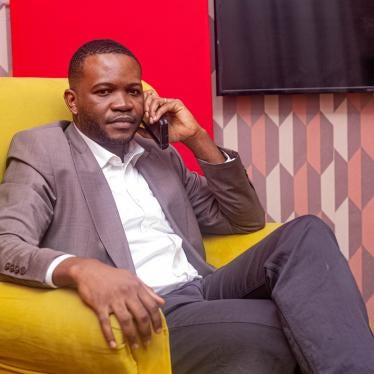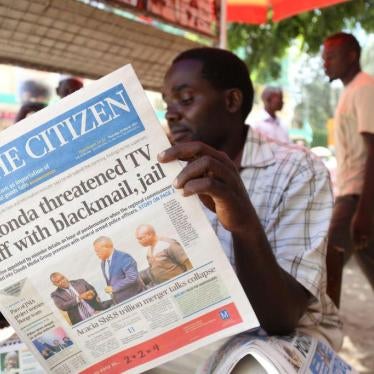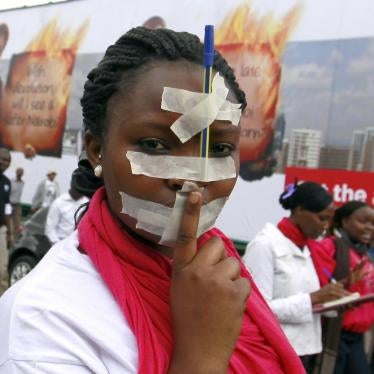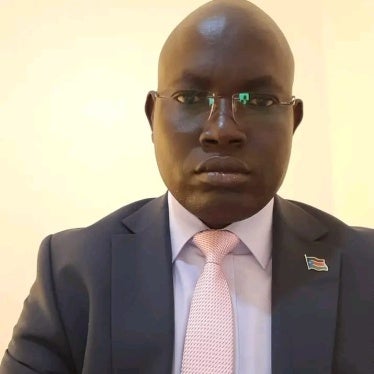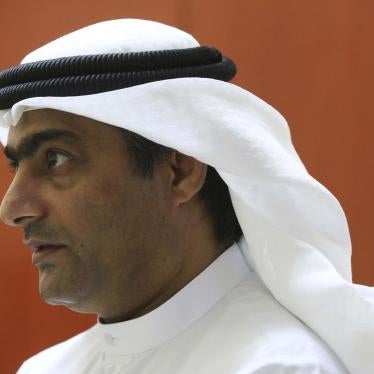(New York) — As the security situation in Côte d’Ivoire deteriorates, the Ivorian authorities must ensure that pro-government militias end all attacks and threats against civilians, Human Rights Watch said today. The government must also cease radio or television broadcasts intended to incite violence against perceived government opponents, Human Rights Watch said today.
United Nations peacekeepers, under Security Council resolution 1528, have the responsibility “to protect civilians under imminent threat of physical violence.” Both within Abidjan and the rural areas, and most urgently in the western cacao-growing region, U.N. peacekeepers should conduct frequent patrols and make their presence felt in areas heavily populated by vulnerable groups. In recent years, northerners, Muslims and West African immigrants have come under attack from pro-government militias, which accuse them of supporting the northern-based rebellion.
“Until they were evacuated, French citizens bore the brunt of the militias’ xenophobic attacks. Now we are concerned the militias will turn their rage on their more familiar targets — Muslims, northerners and West African immigrants,” said Peter Takirambudde, executive director of Human Rights Watch’s Africa Division. “Given the history of militia abuses during Côte d’Ivoire’s political crisis, the United Nations must anticipate such attacks and be ready to respond.”
Over the last few days, local Ivorian human rights activists in hiding told Human Rights Watch about numerous cases of northern civilians and opposition supporters whose houses and business in Abidjan had been ransacked or burned by pro-government militias. On Tuesday, pro-government militias attacked northerners and West African immigrants in the western town of Gagnoa, killing at least five of them.
Speaking on state radio and television, government officials and militia leaders have disseminated continual messages inciting the militias to attack French civilians after French forces destroyed Ivorian aircraft. These messages recently spread to private radio stations. There has been at least one instance in which a broadcaster incitement of an attack included the number plate of a vehicle said to be driven by French nationals.
“The U.N. peacekeepers must be also prepared to silence broadcasts that incite or provide directions for violence,” said Takirambudde.
Since 2000, when Gbagbo took over in flawed elections during which some 200 opposition supporters were killed, the pro-government militias and state security forces have largely ceased to work for the protection of the general population. Instead, they have become partisan supporters of the ruling party, the Ivorian Popular Front (Front Populaire Ivorien, or FPI), and its economic interests. The government has increasingly relied on these militias for both law enforcement and, following a coup attempt in 2002, to combat the rebellion. Members of the militias, the largest of which is the Young Patriots (Jeunes Patriotes), in recent months have reportedly been undergoing military training in Abidjan and elsewhere.
Drawn mainly from youth supporters of the ruling party, the militias have served as a lightly veiled mechanism to intimidate and abuse members of the political opposition and those suspected of opposing the government by virtue of their religion, ethnicity or nationality. Those targeted include northerners, Muslims and West African immigrants mostly from Burkina Faso, Niger, Mali and Guinea.
The pro-government militias have been responsible for numerous serious human rights abuses. In March, they took part in a violent crackdown against opposition supporters during a demonstration in Abidjan, in which at least 120 demonstrators were killed. On November 4, they attacked the hotel housing government ministers representing the opposition New Forces (Forces Nouvelles), and ransacked and burned the offices of at least two opposition newspapers. Throughout the year, rural militias have conducted lethal attacks against West African immigrant farmers in the western part of the country.
The Ivorian government’s failure to hold members of the militias and security forces accountable for these abuses has only strengthened the impunity of these groups and emboldened the perpetrators, both in Abidjan and the rural areas. The U.N. Security Council must therefore follow through with its commitments to ensure that perpetrators of serious human rights crimes from all sides to the conflict are held accountable. From 1999 onward, all parties to the conflict — including the Ivorian military, gendarmes, police forces, pro-government militias and combatants from several rebel factions — have committed serious violations of international humanitarian and human rights law with total impunity.
On Tuesday a report by a U.N. Commission of Inquiry, which spent two months investigating serious violations of international human rights and humanitarian law, was due to be presented to the U.N. Security Council. The report, which was sent to representatives of the Ivorian government and rebel movement in October, is said to contain recommendations on concrete steps the United Nations could take to ensure accountability.
Human Rights Watch believes that holding accountable those individuals responsible for the most serious crimes is crucial for fighting the prevailing culture of impunity and indeed ensuring that peace and stability take root in Côte d’Ivoire. The pursuit of justice for victims must play a central role in all future peace summits, negotiations and other efforts by the international community to end the conflict.
